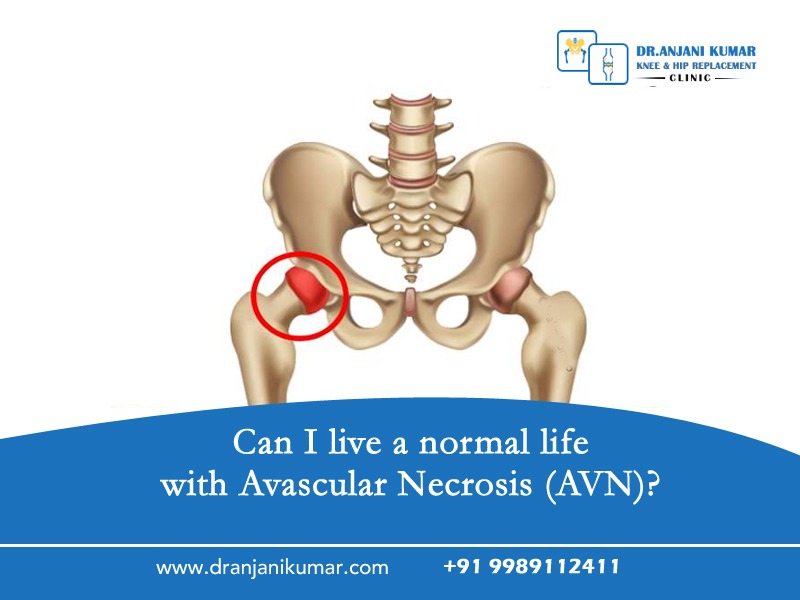“Avascular” refers to a lack of blood supply, while “necrosis” denotes tissue death. A temporary or permanent loss of the blood flow to a bone can cause a disorder called avascular necrosis (AVN), also known as osteonecrosis or aseptic necrosis, which results in the death of bone tissue.
The emergence of AVN might result from a variety of circumstances. Trauma, such as a fracture or dislocation, obstructing the blood supply to the bone, is the most frequent cause.
AVN symptoms can change depending on the afflicted bone’s stage and location. Early on, there can be no symptoms or only a little discomfort or pain. As the illness worsens, symptoms include escalating discomfort, restricted range of motion, stiffness, and unstable joints may appear.

AVN treatment aims to reduce discomfort, maintain joint mobility, and stop future bone deterioration. Painkillers, physical therapy, assistive devices (crutches, braces), and lifestyle changes (weight loss, avoiding excessive drinking or steroid usage) are a few non-surgical options. A better prognosis for AVN depends on early detection and treatments. The degree of bone injury, the particular bone involved, and individual characteristics can all affect the outcome. Monitoring the illness and controlling its progression requires routine follow-up visits with a medical specialist.
Leading a normal life with AVN:
Avascular necrosis (AVN) can make it difficult to live a normal life, but it is feasible with the right management and therapy. The degree of bone destruction, the damaged joint, the stage of AVN, and individual circumstances are only a few of the variables that will determine the result and capacity to lead a normal life.
Consider these safety measures:
Early Detection and Treatment: Early detection and treatment substantially impact the likelihood of maintaining joint function and minimising problems in AVN. If you develop joint pain or other AVN-related symptoms, seeing a doctor is crucial.
Lifestyle Changes: Adapting certain aspects of your lifestyle can help you manage AVN and enhance your quality of life. It may entail keeping a healthy weight, doing low-impact workouts to build the muscles around the afflicted joint, and refraining from strenuous activity.
Pain management: Effective pain treatment is essential for normal life because AVN can lead to chronic discomfort. A customised pain management strategy, including medicine, physical therapy, heat or cold therapy, and complementary treatments like acupuncture or transcutaneous electrical nerve stimulation (TENS), can be created with the assistance of your healthcare professional.

Regular Follow-up and Monitoring: It’s crucial to regularly check in with your healthcare provider to monitor the development of AVN, evaluate the joint function, and make any required modifications to your treatment strategy. They can advise on lifestyle changes, managing discomfort, and other necessary measures.
Support from a psychologist: Living with a chronic illness like AVN can be emotionally taxing. To manage the emotional aspects of living with AVN, seeking psychological treatment—such as counselling or attending support groups—can be beneficial.
Even though AVN can be difficult to manage, many people with the condition can have happy lives with the right guidance and assistance. If you want to improve your quality of life, it’s critical to collaborate closely with your medical team, take their advice, and stay optimistic.
Precautions to reduce additional damage due to AVN
You can take numerous measures to control the condition such as:
Limit Weight-Bearing Activities: Lessens stress; it is advised to limit weight-bearing activities depending on the affected joint. Involves avoiding activities that place an excessive amount of stress on the joint or utilising assistive devices like crutches or a cane to offload the injured joint while walking.
Modify Physical Activities: Physiotherapy can advise you on the best exercises to improve joint stability, maintain muscle strength, and enhance your range of motion.
Follow Medication Instructions: If you are prescribed medication for pain management, take the medicine as directed and let your healthcare practitioner know if you have any questions or experience any side effects.
Avoid Abuse of Alcohol and Tobacco: Abuse of alcohol and tobacco might aggravate AVN by reducing blood circulation. The consumption of alcohol should be moderate or avoided altogether.
Balance between Activity and Rest: It’s critical to balance physical activity and rest. Rest can help symptoms go away, and the affected joint feels better, but too much immobility can cause muscle wasting and stiffness in the joints. To discover the ideal ratio of rest and activity for your unique condition, speak with a physical therapist.
Speaking with your healthcare provider for individualised guidance and suggestions based on your unique situation and requirements is crucial. They can advise you on safety measures appropriate for your circumstance and track your development.
Depending on the patient and the unique circumstances of their accident and treatment, ACL surgery can differ. Always consult your healthcare physician for specific advice on accelerating your ACL healing.
Knee replacement surgery may be recommended in advanced cases, especially if the joint has collapsed or the bone has become severely deformed.
Dr Anjani Kumar has 20 years of experience and successfully performed 2000 knee replacement surgeries, 350 hip replacement surgeries, and 500 pelvic acetabular surgeries throughout his career. Please get in touch with us on Mobile: at +91 9989112411 and by E-mail: anjanikumar@ gmail.com




